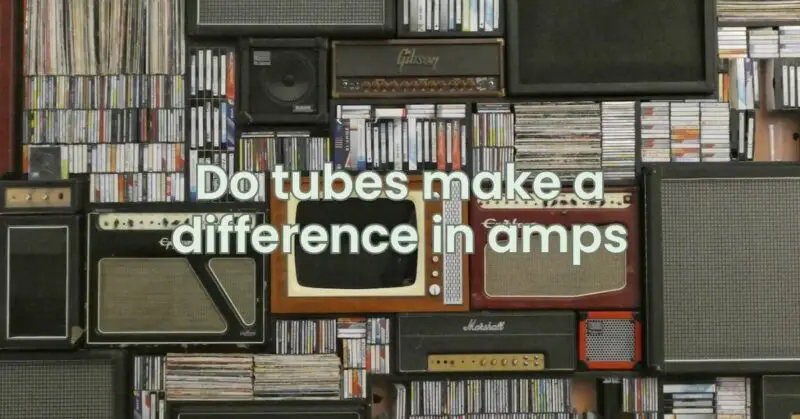In the world of audio amplification, tube amplifiers, also known as valve amplifiers, have a long and storied history. Despite the advancements in solid-state technology, tube amplifiers continue to captivate audiophiles and musicians with their unique sound characteristics. The debate over whether tubes truly make a difference in amps has been a subject of fascination and discussion among audio enthusiasts. In this article, we will explore the essence of tube amplifiers, their distinct qualities, advantages, and why they are cherished by many.
Understanding Tube Amplifiers
Tube amplifiers operate using vacuum tubes or electron tubes to amplify audio signals. These tubes, invented in the early 20th century, were an integral part of audio amplification until the advent of solid-state transistors and integrated circuits in the 1960s. While solid-state amplifiers have become the norm in modern audio equipment due to their reliability, efficiency, and cost-effectiveness, tube amplifiers continue to hold a devoted following for their unique sonic character.
Advantages of Tube Amplifiers
- Warm and Harmonic Sound: One of the primary reasons why tubes are cherished is the warm and rich sound they produce. Tube amplifiers are known for their harmonic distortion, which can add a pleasing and euphonic quality to the audio. This slight distortion often contributes to a more musical and natural listening experience, particularly with certain genres like jazz and classical music.
- Smooth Compression: Tube amplifiers tend to compress audio signals gently when pushed to their limits, resulting in a more forgiving and smoother distortion compared to the harsh clipping found in some solid-state amplifiers. This characteristic is appealing to musicians and recording engineers seeking a more forgiving tone.
- Natural Dynamic Range: Tubes respond differently to changes in volume and input signals, resulting in a more dynamic and expressive sound. This dynamic response often gives tube amplifiers a more “alive” and organic feel, making them preferred choices for audio purists and enthusiasts who prioritize an emotional connection to the music.
- Aesthetic Appeal: Beyond their sound characteristics, tube amplifiers also have a nostalgic and aesthetically pleasing allure. The glowing tubes and vintage aesthetics evoke a sense of nostalgia for audiophiles, adding to the overall appeal of these amplifiers.
Drawbacks of Tube Amplifiers
- High Power Consumption: Tube amplifiers require higher power consumption compared to solid-state amplifiers. This inefficiency can lead to higher electricity bills and potentially generate more heat during prolonged use.
- Cost and Maintenance: Tube amplifiers are generally more expensive than their solid-state counterparts, partly due to the cost of manufacturing and sourcing tubes. Additionally, tubes have a limited lifespan and will eventually require replacement, which can be an ongoing maintenance cost.
Conclusion
The question of whether tubes make a difference in amps ultimately depends on personal preferences and priorities. While solid-state amplifiers have become the standard in most audio setups due to their practicality and efficiency, tube amplifiers offer a distinct and alluring sound quality that continues to attract enthusiasts.
The warm and harmonic sound of tube amplifiers, coupled with their natural dynamic range and smooth compression, create a unique listening experience that many find captivating. Musicians, recording engineers, and audiophiles seeking a vintage, emotional, and organic sonic signature often turn to tube amplifiers for their audio needs.
In the end, the choice between tube and solid-state amplifiers is a matter of taste and how one perceives and enjoys music. Whether you are a purist seeking a nostalgic connection or simply an enthusiast exploring different audio technologies, tube amplifiers undoubtedly occupy a special place in the world of audio amplification.


